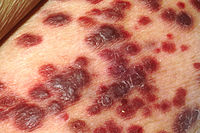
Photo from wikipedia
Primary immunodeficiencies (PIDs) are immune disorders resulting from defects in genes involved in immune regulation, and manifesting as an increased susceptibility to infections, autoimmunity, and cancer. However, the molecular basis… Click to show full abstract
Primary immunodeficiencies (PIDs) are immune disorders resulting from defects in genes involved in immune regulation, and manifesting as an increased susceptibility to infections, autoimmunity, and cancer. However, the molecular basis of some prevalent entities remains poorly understood. Epigenetic control is essential for immune functions, and epigenetic alterations have been identified in different PIDs, including syndromes such as immunodeficiency-centromeric-instability-facial-anomalies, Kabuki, or Wolf-Hirschhorn, among others. Although the epigenetic changes may differ among these PIDs, the reversibility of epigenetic modifications suggests that they might become potential therapeutic targets. Here, we review recent mechanistic advances in our understanding of epigenetic alterations associated with certain PIDs, propose that a fully epigenetically driven mechanism might underlie some PIDs, and discuss the possible prophylactic and therapeutic implications.
Journal Title: Trends in immunology
Year Published: 2019
Link to full text (if available)
Share on Social Media: Sign Up to like & get
recommendations!